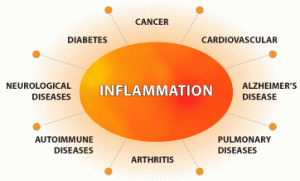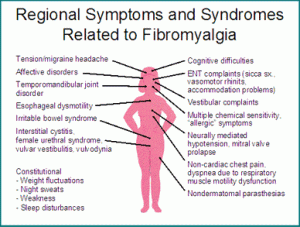Since you’re reading this article, it’s safe to assume that you or a loved one suffer from Restless Legs syndrome. You’ve probably read dozens of articles on this mysterious condition. You have come to learn that there is a PRIMARY type of RLS (where the condition develops naturally, without an obvious cause) and a SECONDARY type of RLS (RLS caused by another underlying health condition).
The truth is that there is only ONE kind of RLS, the kind that is caused by chronic inflammation. There is no other type of RLS.
RESTLESS LEGS SYNDROME IS CONNECTED TO OVER 50 INFLAMMATORY CONDITIONS
Ankylosing Spondylitis (a chronic inflammatory disease of the axial skeleton) is another condition that you can add to the large number of inflammation-based conditions that show a higher prevalence of RLS. A recent study (Tekatas and Pamuk, 2015) found that RLS was significantly more common in patients with Ankylosing Spondylitis compared with healthy controls (30.8 versus 13.2 percent).
The latin suffix “itis” denotes diseases characterized by inflammation. For example, Arthritis (inflammation of one or more joints), Colitis (inflammation of the colon) etc.
You can be certain that any disease or condition that ends with “itis” is going to demonstrate a higher prevalence of Restless Legs Syndrome within its community. The “itis” disease and RLS are both a result of an underlying chronic inflammation.
Many studies have been performed in recent years that show the undeniable relationship between RLS and inflammatory conditions. To date, there are more than 50 inflammatory conditions that show a higher prevalence of RLS. Many of these studies are cited in the paper “Restless Legs Syndrome: Theoretical Roles of Inflammatory and Immune Mechanisms.” (Weinstock et al, 2012). http://www.rlcure.com/rls_study.pdf
CHRONIC INFLAMMATION IS THE UNDERLYING CAUSE OF MOST DISEASES
Many doctors and scientists believe that the primary cause of most diseases is an underlying inflammation. And that belief is growing in leaps and bounds within the medical community. How it eventually manifests or “shows up on the surface” is based on the lifestyle and genetics of each individual.
In some cases it may manifest as cancer, in others as ALS, and in many it manifests several ways. Depression, IBS, Crohn’s disease … the combinations are endless.
Almost any ailment you can think of has the same issue at its core … inflammation.
If you don’t believe me, do a web search “Depression and inflammation”, “ADHD and inflammation”, “Parkinson’s and inflammation” etc. You’ll find a wealth of information on how they are intimately and undeniably linked.
The fact is, most of the people that contact me with questions or comments have other medical conditions that they are dealing with in addition to their RLS. These conditions are ALWAYS inflammation-based.
INFLAMMATORY CONDITIONS ALWAYS HAVE A HIGHER PREVALENCE OF OTHER INFLAMMATORY CONDITIONS
As stated, the reason that RLS has a higher prevalence in relationship to so many medical conditions is because the RLS and the medical condition result from the same core issue – chronic inflammation. They’re like different fingers on the same hand.
We’re focused heavily on RLS, because that’s what we’re dealing with in life. That’s how the chronic inflammation has manifested in our lives.
However, you can take ANY inflammatory condition and find that there is a higher prevalence of any other inflammatory condition (provided there has been a study done at some point). RLS is not unique in this mysteriously connected world.
To illustrate this fact, I’ve taken RANDOM pairs of conditions from the list of inflammatory diseases linked to RLS http://www.rlcure.com/diseases-conditions-that-are-linked-to-restless-legs-syndrome-willis-ekbom-disease.html and did some research to see if there is any known link between these random pairs.
CANCER and ANEMIA
from “Anemia” by MediResource Inc.
“Anemia is very common in people with cancer. In fact, about half of people with cancer develop anemia.”
DEPRESSION and DIABETES
from “Depression is more common in people with diabetes compared with the general population” by the Canadian Diabetes Assc.
“Symptoms of depression affect 30% of people with diabetes, while 10% of them experience major depression.”
PARKINSON’S and IRRITABLE BOWEL SYNDROME
from “Is there an association between inflammatory bowel disease and Parkinson’s disease?” by European Crohn’s and Colitis Organisation – ECCO
“The proportion of PD having concomitant IBD is considerably higher than one would expect.”
FIBROMYALGIA and HEART DISEASE
from “Fibromyalgia linked to heart disease in new study” by EmaxHealth
“A new study has found a link between fibromyalgia and coronary heart disease after comparing patients with the condition to control groups. Researchers discovered that there was an association between the two disorders, and fibromyalgia patients were more likely to have heart disease.”
MIGRAINES and OBESITY
from “Migraine and Obesity: What You Should Know!” by B. Lee Peterlin, DO
“Those with general obesity have a greater prevalence of high frequency migraine (migraines occurring 10-14 days per month) than those without.”
COLITIS and MULTIPLE SCLEROSIS
from “Association between ulcerative colitis and multiple sclerosis.” (Pokorny et al. 2007).
“The association between ulcerative colitis and MS appears to be real and may help identify common factors involved in the cause of these two diseases.”
You could spend weeks mixing and matching the various conditions. What you’ll find is that there is always a higher prevalence, a definite link between them.
THERE IS A HIGHER PREVALENCE OF INFLAMMATORY CONDITIONS FOR THOSE WITH FIBROMYALGIA 
I’m going to use fibromyalgia in this mini-study to show that the link that RLS has with various inflammatory medical conditions is not unique. You can find similar links with any inflammatory condition – cancer, colitis, depression etc. but in this case I’m going to use fibromyalgia as the benchmark.
FIBROMYALGIA and RESTLESS LEGS SYNDROME
from “Restless legs syndrome and leg cramps in fibromyalgia syndrome: a controlled study.” (Yunus and Aldag, 1996).
“Our study shows an association between fibromyalgia syndrome and restless legs syndrome as well as leg cramps and confirms a previously reported association between rheumatoid arthritis and restless legs. The basis of this association is not clear. Fibromyalgia is not a psychiatric condition, and we found no association between restless legs syndrome and psychological state.”
FIBROMYALGIA and DEPRESSION
from “Bipolar Disorder Common in Fibromyalgia” by Jessica Ward Jones, MD, MPH, Psych Central
“Many fibromyalgia patients may also suffer from bipolar disorder as well as depression. New research suggests that just over 25 percent of patients with fibromyalgia also have symptoms of bipolar disorder.”
FIBROMYALGIA and MIGRAINES
from “7 Conditions Linked to Fibromyalgia” by Health.com
“A significant number of people with fibromyalgia also experience migraines and/or tension headaches, says Robert Duarte, MD, director of the Pain Institute at the North Shore–Long Island Jewish Health System, in Manhasset, N.Y.”
FIBROMYALGIA and IRRITABLE BOWEL SYNDROME (IBS)
from “7 Conditions Linked to Fibromyalgia” by Health.com
“Irritable bowel syndrome (IBS) is marked by abdominal cramps and bouts of constipation and/or diarrhea. Between 30% and 70% of people with fibromyalgia have IBS too.”
FIBROMYALGIA and OBESITY
from “Fibromyalgia and obesity: the hidden link” (Ursini et al. 2011).
“Epidemiological data show that Fibromyalgia patients have higher prevalence of obesity (40%) and overweight (30%) in multiple studies compared with healthy patients.”
After reading the above data, hopefully you’ll come to understand that the link between RLS and other inflammatory conditions is not unique at all. This whole belief about there being a PRIMARY and SECONDARY RLS just isn’t real. It’s like saying there’s a PRIMARY and SECONDARY depression, or a PRIMARY and SECONDARY migraine.
I urge you to do your own research in this area. Take any pair of conditions that interest you from this list http://www.rlcure.com/diseases-conditions-that-are-linked-to-restless-legs-syndrome-willis-ekbom-disease.html and do a search to see if they are knowingly linked.
Eventually you’ll realize, that without a doubt, there is growing inflammation beneath the surface that is causing this laundry list of conditions.
RLS is only one of its many faces.


